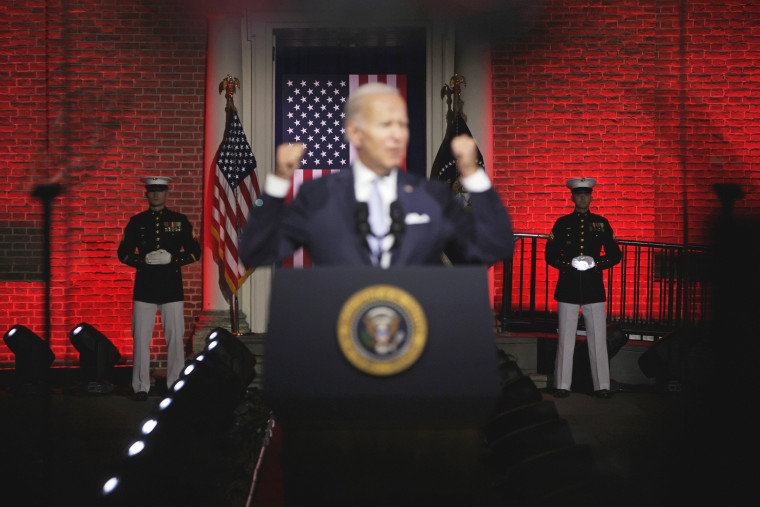President Joe Biden delivered a striking prime-time speech in Philadelphia on Thursday night warning about the existential threat posed by MAGA Republicans. But some political observers noticed something unusual: two Marines flanking him in the background as he spoke.
CNN's Jeff Zeleny, for example, claimed that the Marines, combined with a nearby Marine band that played as Biden took the stage, marked “a break with White House traditions.” That claim was rebutted by many critics, who pointed out that several previous presidents have used the presence of troops as part of their backdrop during notable speeches. And, of course, Donald Trump used the military symbolism of Gen. Mark A. Milley, the chairman of the Joint Chiefs of Staff, in a now infamous photo-op during which the then-president floated the idea of flooding the streets with troops to put down antiracist protests.
Biden aimed to showcase his faith in the military apparatus and its ability to back the democratic order.
But while it’s true that the presence of military members was not unprecedented, it's also not the norm. And it was intentional — stagecraft is a major part of political oratory. So it’s worth contending with why the administration chose to have Marines so prominently displayed.
The White House said in a statement on Friday that it was a gesture of "respect" for these service members. But that doesn't really explain why they were at this specific event. The speech itself provides clues. Biden focused in his remarks on identifying Trump and his most hardcore supporters as a danger to the republic, with their disregard for democratic rule and their propensity for political violence. By placing Marines in his periphery, Biden aimed to showcase his faith in the military apparatus and its ability to back the democratic order — to defend against future attacks on the electoral system. It was an answer to Trump's attempts to thwart a peaceful transfer of power and mobilize the military against democracy during his tenure.
“For a long time, we’ve told ourselves that American democracy is guaranteed, but it’s not,” Biden said. “We have to defend it, protect it, stand up for it.” He implied those Marines, who stood with him in front of Independence Hall, where the Declaration of Independence was approved and where the Founding Fathers wrote the Constitution, are a key part of protecting democracy.
Biden’s faith (probably) isn’t misplaced. Top military officials were instrumental in thwarting Trump’s insurrection attempts when he was in office. Milley and other military officials talked Trump down after he called on them to shoot protesters in the legs, and they covertly maneuvered to ensure a peaceful transfer of power as Trump manufactured lies about election fraud. Trump’s defense secretary, Mark Esper, publicly shot down his calls to invoke the Insurrection Act, which would have deployed troops to the streets. In 2020, more than half of the military’s officer corps said they strongly disapproved of the president, a phenomenon likely explained by military officers’ attachment to legal norms and propriety, and their relatively high levels of education (one of the most common predictors of opposition to Trump).
Biden’s military optics were also a kind of pitch. In a speech about the urgent need to form a national coalition against what he’s previously called “semi-fascism,” the president was signaling that he needed not just the solidarity of citizens on the left and the mainstream right, but also the support of those whose job it is to keep the state safe to remain vigilant against fascism.
Some analysts criticized Biden for symbolically politicizing the military. But Biden was in reality responding to Trump's attempted politicization of it.
Both Trump and now Biden have played with the symbolism of the military’s relationship with democracy in political oratory, but toward radically different ends: Trump wished to use the military to subvert democracy, while Biden hopes that the military will help protect it. Trump wanted the military to serve as a personal security force — he longed to repress dissidents, and to deploy the National Guard on Jan. 6 to protect pro-Trump protesters. Biden hasn’t actually tried to bring the military into political affairs and civilian life. And that’s obviously appropriate, since the civilian-military divide remains a bedrock of democracy. The military's allegiance is to the state, not to a political party or leader.
Personally, I wouldn’t have used Marines in my photo-op. And I understand why that symbolism, amplified perhaps by the dramatic red backlighting, may have felt ominous. But if you listened to Biden’s words and observe his actions — which took place as Trump is effectively moving toward launching a paramilitary — it's clear that this speech wasn’t about praising or glorifying martial law. It was about protecting against it.

